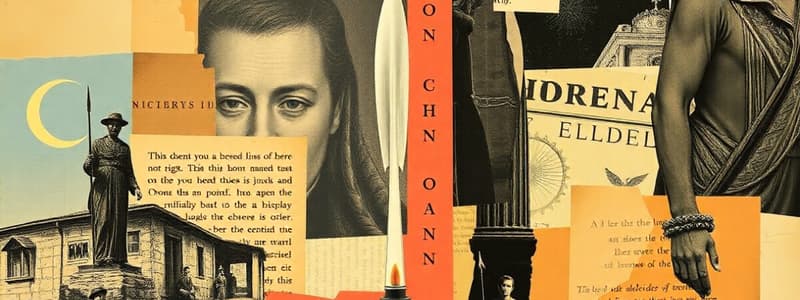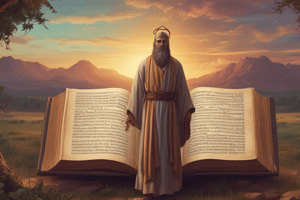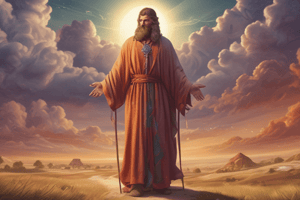Podcast
Questions and Answers
What is the sign of God's covenant with Noah?
What is the sign of God's covenant with Noah?
- Dove
- Cross
- Rainbow (correct)
- Fire
Abram's condition for the covenant was to build an altar.
Abram's condition for the covenant was to build an altar.
False (B)
What was the blessing offered to Moses in the covenant?
What was the blessing offered to Moses in the covenant?
I will be your God, you will be my people
The covenant established with Abraham had a condition of __________.
The covenant established with Abraham had a condition of __________.
Match the following figures with their respective relationship in the covenant:
Match the following figures with their respective relationship in the covenant:
Which covenant involved the sign of Passover?
Which covenant involved the sign of Passover?
The plagues during Moses' time served to demonstrate God's power over pagan gods.
The plagues during Moses' time served to demonstrate God's power over pagan gods.
Who were the two main figures that attempted to help God fulfill His promise of descendants?
Who were the two main figures that attempted to help God fulfill His promise of descendants?
Ishmael is not the promised son, but __________ traces its roots to Abraham through Ishmael.
Ishmael is not the promised son, but __________ traces its roots to Abraham through Ishmael.
What misconception did the Jewish people have regarding the concept of a Holy Nation?
What misconception did the Jewish people have regarding the concept of a Holy Nation?
What does redemption entail in Christianity?
What does redemption entail in Christianity?
Saul was the first king of Israel and obeyed all of God's commands.
Saul was the first king of Israel and obeyed all of God's commands.
Who did Samuel anoint as king after Saul?
Who did Samuel anoint as king after Saul?
The new covenant promises that God will write His law on their ______.
The new covenant promises that God will write His law on their ______.
Match the following events with their significance:
Match the following events with their significance:
What is a key difference between redemption and restoration?
What is a key difference between redemption and restoration?
The promise of a new covenant is similar to previous covenants, which were kept by the people.
The promise of a new covenant is similar to previous covenants, which were kept by the people.
What did Jeremiah prophesy about the Jewish stronghold?
What did Jeremiah prophesy about the Jewish stronghold?
Christianity links the expected messiah with the suffering ______.
Christianity links the expected messiah with the suffering ______.
What was Nietzsche's view of Christianity's impact on Eros?
What was Nietzsche's view of Christianity's impact on Eros?
What are the two primary sources of revelation in Christian theology?
What are the two primary sources of revelation in Christian theology?
How does the concept of conversion relate to authentic relationships in Christianity?
How does the concept of conversion relate to authentic relationships in Christianity?
In Christian theology, what is the significance of humanity's unique relationship with God as described in Genesis?
In Christian theology, what is the significance of humanity's unique relationship with God as described in Genesis?
What does Benedict XVI suggest about the relationship between Eros and Agape in Christian thought?
What does Benedict XVI suggest about the relationship between Eros and Agape in Christian thought?
What do the various senses of scripture imply about interpreting Sacred Scripture?
What do the various senses of scripture imply about interpreting Sacred Scripture?
Flashcards are hidden until you start studying
Study Notes
Covenants
- God's redemptive plan establishes proper relationships through covenants.
- Covenants have four features: blessing, condition, sign, and new relationship.
- Humans break covenants but God remains faithful.
- Each successive covenant offers a greater blessing and relationship.
Noahic Covenant
- Blessing: Never again will the earth be destroyed by flood.
- Condition: No one is to shed the blood of another human being.
- Sign: Rainbow
- Relationship: Family
Abrahamic Covenant
- Blessing: Land and descendants.
- Condition: Circumcision.
- Sign: Circumcision.
- Relationship: Tribal Nation.
- Abraham and Sarah try to "help" God fulfill his promise.
- Abraham suggests his servant, Eliezer, could be his heir.
- Sarah has a son named Ishmael with Hagar, her servant.
- Sarah later has a son named Isaac, who becomes the promised descendant.
Mosaic Covenant
- Blessing: “I will be your God, you will be my people."
- Condition: Follow God's ways (commandments).
- Sign: Passover.
- Relationship: Holy Nation.
- The Jewish people did not understand the meaning of being a Holy Nation. They desired political power.
- God’s intention was to gather other nations to himself through the Holy Nation.
- The plagues expose and disempower pagan gods and reveal the God of Israel as the one true God.
- The plagues are not about God being a god of violence but rather the One true God who disempowers all false claimants to deity.
- The story of the Israelites in the desert demonstrates how they broke the covenant.
Isaiah
- Deutero Isaiah wrote during the Babylonian exile.
- The Suffering Servant is a key figure.
- Christians connect the Suffering Servant with Christ.
- The Jewish people did not agree on the identity of the Suffering Servant.
- They did not connect the Suffering Servant with the Messiah.
- Isaiah condemns idolatry.
- He confronts the Jewish people for adopting pagan ways.
- He promises God will restore Israel.
- The Jews saw this fulfilled when Cyrus conquered Babylon and allowed them to return to their homeland.
- Redemption differs from restoration: It is not simply going back to a prior state, but entering into a new relationship with God and becoming a new creation.
- The way to redemption involves self-sacrifice.
Jeremiah
- Jeremiah prophesizes both the destruction and restoration of Israel.
- He proclaims that Ramah will weep, and Rachel will mourn.
- This happened in 586 BC during the Babylonian Exile.
- Jeremiah promises a new covenant that will not be broken.
- It will be written on humankind's hearts.
- God will be known, and he will forgive.
- God’s response to sin is mercy and a new covenant.
Kings
- Israel wanted a king to be like other nations.
- This is a refutation of the meaning of being a "holy nation."
- Saul becomes the first king.
- Saul disobeys God by offering sacrifices and keeping items.
- Saul wanted to manipulate God and incorporate pagan items into the kingdom.
- God declares that Saul's line will not be the royal line.
- Samuel anoints David as king.
- David is not the obvious choice.
- The story of David and Goliath highlights the importance of relying on God.
- We cannot defeat our spiritual battles on our own.
- It is only the Lord working through us that can bring about good deeds.
- David and Bathsheba highlight the consequences of sin and the importance of repentance and reconciliation.
- David's sin led to the death of his son, and his kingdom was threatened.
- This story is about conversion from sin.
Christianity and Eros
- Nietzsche claims that Christianity poisoned Eros and turned sexuality into a taboo.
- Benedict XVI argues that Christianity heals Eros by infusing it with Agape.
- Agape, without a connection to the flesh, can lead to stoicism and Gnosticism.
- Eros, in its most primitive form, leads to seeking happiness through pleasure.
- When informed by Agape, Eros seeks happiness for the beloved rather than oneself.
Theology
- The goal of theology is to understand faith through reason.
- Theology differs from religion and religious studies: theology seeks to understand the truths of religion through critical thinking and intellectual inquiry.
- Religion and religious studies focus on the practice and rituals of faith rather than on deeper intellectual understanding.
Revelation
- Revelation is the way God reveals himself to humanity.
- The two sources of revelation are Sacred Scripture and Sacred Tradition.
- The Church is responsible for ensuring that revelation is transmitted faithfully and without error.
Sacred Scripture
- God is the ultimate author of Sacred Scripture.
- Human authors played a role in writing Scripture, inspired by God.
- There are different senses of Scripture:
- Literal: The literal meaning of the text.
- Spiritual: The spiritual meaning of the text.
- Allegorical: The symbolic meaning of the text.
- Moral/Tropological: The moral meaning of the text, teaching us how to live.
- Anagogical: The eschatological meaning of the text, pointing towards the end times and eternal life.
- The Old and New Testaments are connected: The New Testament fulfills the Old Testament.
- The Gospels of Matthew, Mark, Luke, and John describe the earthly life of Jesus.
Christianity as an Encounter with a Person
- Christianity is primarily about a relationship with God, specifically with Jesus Christ.
- Conversion to Christianity cannot be forced or coerced.
- Being a Christian is a calling, not a choice.
- The Church is called from the world into a relationship with God based on love.
- The Christian God is knowable, allowing for a relationship between God and humanity.
Christianity and Eros
- Nietzsche believed that Christianity poisoned Eros, turning sexuality into a taboo.
- Pope Benedict XVI argued that Christianity heals Eros.
- Eros needs to be infused with Agape, a selfless and unconditional love.
- Agape without Eros can lead to stoicism or Gnosticism.
- Eros, in its purest form, seeks happiness for the beloved, not just for oneself.
Creation
- Genesis 1 and Genesis 2 reveal theological truths about creation:
- God is the creator of everything.
- Humanity has a unique relationship with God, giving them dignity.
- Humans are the only creatures capable of knowing and loving God.
- Humans possess the capacity for self-knowledge and self-possession.
- Humans are given dominion over creation.
- Humans are instructed to flourish and multiply.
- Man and woman are created as equals and complements.
- Humanity was originally in a state of Original Justice, characterized by harmony in interpersonal relationships and with creation.
The Fall
- Sin occurred through deceit, leading humans to believe God was holding them back from their potential.
- This deceit impacted free will, preventing humanity from fully understanding the good.
- Sin is a denial of God's goodness, suggesting that God is not good.
- Sin affects relationships:
- Intrapersonal relationships are marred, leading to rivalry and scapegoating.
- Humanity's relationship with creation is affected.
- Humanity separates itself from God, but God does not separate himself from humanity.
- Humanity hides from God and is ashamed.
- This separation is permanent, as humanity can never return to the Garden or Original Justice.
Sin Grows and Proliferates
- The story of Cain and Abel illustrates the movement from pride and envy to murder.
- Cain and Abel, despite being brothers, were not in harmony.
- Rivalry arose when one sacrifice was chosen over another.
- Cain's statement "Am I my brother's keeper?" reflects a denial of brotherhood and responsibility.
Covenants
- God’s redemptive plan aims to establish proper relationships.
- Covenants have four features: blessing, condition, sign, and new relationship.
- Humanity breaks covenants, but God remains faithful.
- Each successive covenant offers a greater blessing and establishes a deeper relationship.
Noah
- Blessing: Never again will Earth be destroyed by flood.
- Condition: No one is to shed the blood of another human being.
- Sign: The rainbow.
- Relationship: Family.
Abram/ Abraham
- Blessing: Land and descendants.
- Condition: Circumcision.
- Sign: Circumcision.
- Relationship: Tribal Nation.
Moses
- Blessing: " I will be your God, you will be my people."
- Condition: Follow my ways (commandments).
- Sign: Passover.
- Relationship: Holy Nation.
The Plagues
- The plagues expose and disempower pagan gods, revealing the God of Israel as the one true God.
- They demonstrate God’s power and justice.
- They are not about God being violent, but about him defeating false deities.
The People in the Desert
- The people in the desert broke the covenant by disobeying God.
Prophets
Isaiah
- Deuter Isaiah wrote during the end of the Babylonian Exile.
- The Suffering Servant is a key figure in Isaiah's writings.
- Christians connect the Suffering Servant to Jesus Christ.
- Isaiah condemns idolatry, confronting the Jewish people for embracing pagan ways.
- Isaiah also prophesies about God’s restoration of Israel.
Jeremiah
- Jeremiah prophesies about the destruction and restoration of Israel.
- He foretells the fall of Jerusalem and the Babylonian Exile (586 BC).
- Jeremiah promises a new covenant, unlike previous ones.
- This new covenant will involve God's law being written on people's hearts and forgiveness for their sins.
Kings
- The Israelites desired a king like other nations, rejecting the concept of a "holy nation."
- Saul became the first king.
- Saul disobeyed God: he offered sacrifices (attempting to manipulate God) and kept pagan items ( trying to incorporate pagan practices into the Kingdom of God).
- God declared that Saul's line would not continue.
David
- Samuel anointed David as king.
- David was not the obvious choice, but God saw differently than humans.
- David’s victory over Goliath illustrates the need to rely on God:
- David acknowledges that he cannot defeat Goliath on his own.
- He relies on God’s power to achieve victory.
- The story of David and Bathsheba illustrates that even the most righteous can fall into sin.
- The story highlights the consequences of adultery and murder and the need for conversion.
Studying That Suits You
Use AI to generate personalized quizzes and flashcards to suit your learning preferences.




